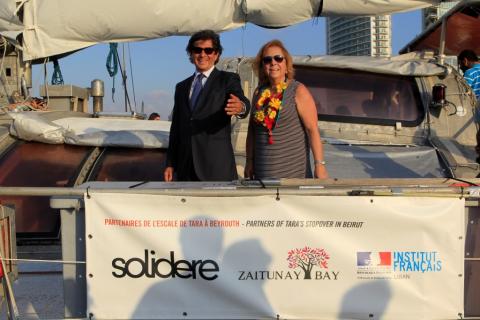
AFTER MORE THAN FOUR YEARS SAILING AROUND THE WORLD AND THE ARCTIC, TARA WILL BE ON MISSION IN THE MEDITERRANEAN FROM MAY TO NOVEMBER 2014, WITH TWO OBJECTIVES: TO ACCOMPLISH A SCIENTIFIC STUDY CONCERNING PLASTIC POLLUTION, AND TO PROMOTE AWARENESS OF ENVIRONMENTAL CHALLENGES IN THE MEDITERRANEAN REGION. MAY TO NOVEMBER 2014
BACKGROUND 450 million people live along the Mediterranean coasts in 22 bordering countries. Due to its geography and climate, the Mediterranean Sea hosts close to 8% of global marine biodiversity, although representing only 0.8% of the ocean’s surface. Today’s cities are saturated and almost 30% of the world’s maritime traffic is concentrated in the Mediterranean. Problems related to pollution from land are increasing, putting pressure on the marine ecosystem essential for the people of the region, and for life in general. Among the pollutants is the growing presence of micro-plastics. These are most likely incorporated into the food chain, and thus into our diets. It is therefore urgent to find concrete solutions such as water treatment, waste management, biodegradable plastics, promotion of sustainable tourism, and the creation of Marine Protected Areas (MPAs) – solutions proposed decades ago by the Barcelona Convention, the U.N. Convention on Biological Diversity, and also by the European Union.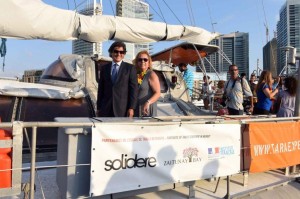
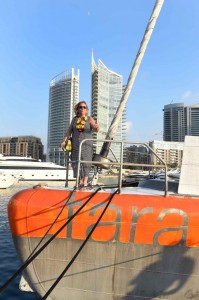
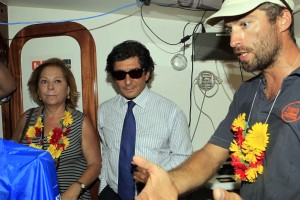
THE SCIENTIFIC MISSION
A scientific study on plastic will be conducted aboard Tara coordinated by the Laboratoire de Villefranchesur-mer (Université Pierre et Marie Curie and CNRS) and the University of Michigan (USA).
The accumulation of plastic debris in nature is “one of the most ubiquitous and long-lasting recent changes to the surface of our planet…” (Barnes et al, 2009), and one of the major environmental concerns of our time. Yet we know too little about what happens to these plastics and their role in ecosystem dynamics to predict their future impacts on the oceans of our planet and on humans. To fill this gap, scientists board Tara will undertake an interdisciplinary mission to better understand the impacts of plastic on the Mediterranean ecosystem. They will quantify plastic fragments, and measure their size and weight. They will also identify the types of plastic (and adhering organic pollutants) found in the sea, and study the dynamics and function of microbial communities (bacteria, protozans, micro-algae, molluscs, crustaceans) living on the plastic. Included in the latter are questions about the probable entry of these molecules into the food chain – a subject virtually unexplored in the Mediterranean. This floating plastic carted by large rivers flowing into the Mediterranean became a component of the ecosystem that influences the chemistry of the sea,” says Dr. Gaby Gorsky, chief scientist of the mission and director of the Oceanographic Observatory of Villefranche -sur-Mer.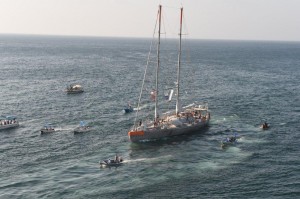 This work will complement the research accomplished aboard Tara in the Pacific during the Tara Oceans expedition in October 2011, and in the Arctic in 2013, and will
add to the research carried out by the MED Expedition in the north-western Mediterranean.
This work will complement the research accomplished aboard Tara in the Pacific during the Tara Oceans expedition in October 2011, and in the Arctic in 2013, and will
add to the research carried out by the MED Expedition in the north-western Mediterranean.
The results of this scientific study aim to influence the policy-makers and populations of countries bordering the Mediterranean towards better waste management and sanitation. The results will also encourage industrial innovation in developing new bio-degradable plastics.
Two scientists in charge of research protocols will always be on board, guided by satellite data via ground stations. Net hauls will be performed at the water’s surface, night and day, when Tara is at sea.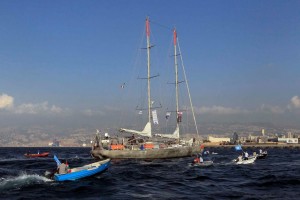 SCIENTIFIC GOALS OF THE TARA MEDITERRANEAN EXPEDITION:
SCIENTIFIC GOALS OF THE TARA MEDITERRANEAN EXPEDITION:
- Evaluate the spatial distribution of floating plastic fragments (0.3 to 50 mm) in the Mediterranean Sea
- Chemical analyses of the different plastics
- Scanning electron microscopy, stereo microscopy and genomic analysis of microbial communities attached to the plastic
- Study the plankton ecosystems in contact with plastic fragments – day and night variability
- Record environmental characteristics – temperature, salinity, turbidity, pigments, ocean color
The team from the University of Maine (USA) in collaboration with NASA will also install instruments aboard Tara to measure turbidity in relation with algal pigments and satellite measurements.
SCIENTIFIC DIRECTOR: Gaby Gorsky, Professor at UPMC, director of the Oceanographic Observatory of Villefranche sur mer (Université Pierre et Marie Curie and CNRS) EDUCATIONAL AWARENESS “Tara used to go to distant countries, this year she is in the Mediterranean, in the heart of civilization. Beyond research on plastic pollution, the mission promises to be strong in meetings, culture and humanity. Welcome onboard “ROMAIN TROUBLÉ, SECRETARY GENERAL OF TARA This expedition, the schooner’s tenth since 2003, is an opportunity for Tara Expeditions to promote the efforts of local and regional associations* on many environmental issues concerning this almost-closed sea. — We will work with MedPAN, the network managers of MPAs in the Mediterranean to promote these initiatives. Indeed, the creation and effective administration of MPAs identified by their rich biodiversity, encourages all users to agree on sustainable management of the sea. Today, these “protected” areas often lack resources and are still too few to cover 10 % of the sea by the year 2020 – target date set by the Convention on Biological Diversity. — Scientific research conducted aboard Tara on plastic will be an opportunity to communicate about the impacts and potential solutions to reduce this pollution. In co-operation with the European Commission, Tara will promote solutions reducing pollutants in the Mediterranean. — During these seven months, Tara Expeditions will also share the first analyses from the Tara Oceans expedition (2009-2012). This major scientific mission began in 2009 in the Mediterranean. Five years later we will meet our local partners with the latest results. All data (physico-chemical, temperature, salinity, oxygen, fluorescence, dissolved nitrate, chlorophyll) will be available online before May 2014. — A traveling exhibition and films will be shared with the public. We will also welcome classes aboard at each stopover. Artists will be in residence on Tara for the duration of the expedition.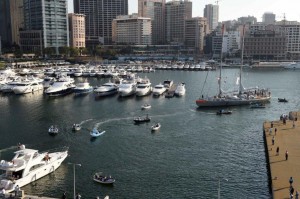 APRIL 13: Departure from Lorient
MAY 5-23: Study of reefs at the Port Cros National Park
(France), the first MPA of France
MAY 22: International Day for Island Biodiversity
MAY 23-28: Stopover in Toulon (France)
MAY 29- JUNE 2ND: Stopover at Embiez (France)
JUNE 5: World Environment Day
JUNE 8: World Oceans Day
JUNE 10-15: Stopover in Nice (France)
JUNE 16-18: Stopover in Villefranche sur Mer (France)
JUNE 19-20: Stopover in Monaco
JUNE 21: World Ocean Sampling Day, Tara in the bay
of Villefranche sur mer
JUNE 22-26: Stopover in Antibes (France)
JULY 5-9: Stopover in Cala Gonone (Sardinia, Italy):
Scientific meeting - Oceanomics in collaboration with
the Aquarium of Cala Gonone (Sardinia)
JULY 15-20: Stopover in Durrës (Albania)
JULY 24-31: Stopover in Cyclades (Greece)
AUGUST 5-12: Stopover in Beirut (Lebanon) in collaboration
with Solidere
AUGUST 29-30: Stopover in La Valette (Malta)
SEPTEMBER1-6: Stopover in Bizerte (Tunisia)
SEPTEMBER 9-14: Stopover in Algiers (Algeria)
SEPTEMBER 20-29 : Stopover in Marseille (France)
SEPTEMBER 30- OCTOBER 5: Stopover in St. Tropez (France)
OCTOBER 9-14: Stopover in Naples (Italy)
OCTOBER 24 - NOVEMBER 2: Stopover in Genoa (Italy), Science Festival
NOVEMBER 4-9: Stopover in Palavas les Flots (France)
NOVEMBER 10-14: Stopover in Perpignan (France)
NOVEMBER 15-19: Stopover in Barcelona (Spain)
NOVEMBER 23-28: Stopover in Tangier (Morocco)
in collaboration with the Mohammed VI Foundation
NOVEMBER 29-30: Stopover in Faro (Portugal)
DECEMBER 7: Return to Lorient
RELAY CAPTAINS:
Martin Hertau and Samuel Audrain
EDUCATIONAL AWARENESS HIGHLIGHTS
FIGURES
EXPEDITION TIME : 7 months
NUMBER OF STOPOVERS: 22
NUMBER OF COUNTRIES: 11
TOTAL DISTANCE COVERED: 16 000 kms
ESTIMATED NUMBER OF PLASTIC MICRO-FRAGMENTS
IN THE MEDITERRANEAN SEA: 250 billions
(source of statistics: Expedition MED)
NUMBER OF MEDITERRANEAN MARINE PROTECTED AREAS: 170
PERCENTAGE OF POLLUTION IN THE MEDITERRANEAN ORIGINATING
ON LAND: 90 %
STOPOVER PROGRAMS :
Film projection, exhibition, school visits, conference with a local association. At each stopover, representatives from surrounding Marine Protected Areas will present the work being done in their regions.
PARTNERS
agnès b., Prince Albert II of Monaco Foundation, Veolia Foundation, IDEC, Serge Ferrari, UNESCO/IOC, MedPAN, Surfrider Foundation Europe, Lorient Agglomeration,
Ministry of Ecology and Sustainable Development of Energy, CNRS, AFP, Le Monde, RFI, France 24, MCD.
THE SCIENTIFIC PARTNERS
Oceanography Laboratory of Villefranche-sur-Mer, CNRS, University of Michigan, University of Maine, Ecole Normale Supérieure, NASA, Free University of Berlin, Pierre and Marie Curie University, IFREMER, Oceanological Observatory of Banyuls, University Bretagne Sud, Toulon University South University Aix Marseille Université de Corse.
*LOCAL AND REGIONAL ASSOCIATIONS
INVOLVED TO DATE:
Expedition MED, Mohammed VI Foundation for the Environment, Acquario di Cala Gonone, Network-Euro-Mediterranean, Paul Ricard Oceanographic Institute, Fondation
Annah Lindt, EcoOcéan Institut.
UNDER THE HIGH PATRONAGE OF JANEZ POTOČNIK, MEMBER OF THE EUROPEAN COMMISSION (IN CHARGE OF ENVIRONMENTAL QUESTIONS)
APRIL 13: Departure from Lorient
MAY 5-23: Study of reefs at the Port Cros National Park
(France), the first MPA of France
MAY 22: International Day for Island Biodiversity
MAY 23-28: Stopover in Toulon (France)
MAY 29- JUNE 2ND: Stopover at Embiez (France)
JUNE 5: World Environment Day
JUNE 8: World Oceans Day
JUNE 10-15: Stopover in Nice (France)
JUNE 16-18: Stopover in Villefranche sur Mer (France)
JUNE 19-20: Stopover in Monaco
JUNE 21: World Ocean Sampling Day, Tara in the bay
of Villefranche sur mer
JUNE 22-26: Stopover in Antibes (France)
JULY 5-9: Stopover in Cala Gonone (Sardinia, Italy):
Scientific meeting - Oceanomics in collaboration with
the Aquarium of Cala Gonone (Sardinia)
JULY 15-20: Stopover in Durrës (Albania)
JULY 24-31: Stopover in Cyclades (Greece)
AUGUST 5-12: Stopover in Beirut (Lebanon) in collaboration
with Solidere
AUGUST 29-30: Stopover in La Valette (Malta)
SEPTEMBER1-6: Stopover in Bizerte (Tunisia)
SEPTEMBER 9-14: Stopover in Algiers (Algeria)
SEPTEMBER 20-29 : Stopover in Marseille (France)
SEPTEMBER 30- OCTOBER 5: Stopover in St. Tropez (France)
OCTOBER 9-14: Stopover in Naples (Italy)
OCTOBER 24 - NOVEMBER 2: Stopover in Genoa (Italy), Science Festival
NOVEMBER 4-9: Stopover in Palavas les Flots (France)
NOVEMBER 10-14: Stopover in Perpignan (France)
NOVEMBER 15-19: Stopover in Barcelona (Spain)
NOVEMBER 23-28: Stopover in Tangier (Morocco)
in collaboration with the Mohammed VI Foundation
NOVEMBER 29-30: Stopover in Faro (Portugal)
DECEMBER 7: Return to Lorient
RELAY CAPTAINS:
Martin Hertau and Samuel Audrain
EDUCATIONAL AWARENESS HIGHLIGHTS
FIGURES
EXPEDITION TIME : 7 months
NUMBER OF STOPOVERS: 22
NUMBER OF COUNTRIES: 11
TOTAL DISTANCE COVERED: 16 000 kms
ESTIMATED NUMBER OF PLASTIC MICRO-FRAGMENTS
IN THE MEDITERRANEAN SEA: 250 billions
(source of statistics: Expedition MED)
NUMBER OF MEDITERRANEAN MARINE PROTECTED AREAS: 170
PERCENTAGE OF POLLUTION IN THE MEDITERRANEAN ORIGINATING
ON LAND: 90 %
STOPOVER PROGRAMS :
Film projection, exhibition, school visits, conference with a local association. At each stopover, representatives from surrounding Marine Protected Areas will present the work being done in their regions.
PARTNERS
agnès b., Prince Albert II of Monaco Foundation, Veolia Foundation, IDEC, Serge Ferrari, UNESCO/IOC, MedPAN, Surfrider Foundation Europe, Lorient Agglomeration,
Ministry of Ecology and Sustainable Development of Energy, CNRS, AFP, Le Monde, RFI, France 24, MCD.
THE SCIENTIFIC PARTNERS
Oceanography Laboratory of Villefranche-sur-Mer, CNRS, University of Michigan, University of Maine, Ecole Normale Supérieure, NASA, Free University of Berlin, Pierre and Marie Curie University, IFREMER, Oceanological Observatory of Banyuls, University Bretagne Sud, Toulon University South University Aix Marseille Université de Corse.
*LOCAL AND REGIONAL ASSOCIATIONS
INVOLVED TO DATE:
Expedition MED, Mohammed VI Foundation for the Environment, Acquario di Cala Gonone, Network-Euro-Mediterranean, Paul Ricard Oceanographic Institute, Fondation
Annah Lindt, EcoOcéan Institut.
UNDER THE HIGH PATRONAGE OF JANEZ POTOČNIK, MEMBER OF THE EUROPEAN COMMISSION (IN CHARGE OF ENVIRONMENTAL QUESTIONS)Categories
- Log in to post comments